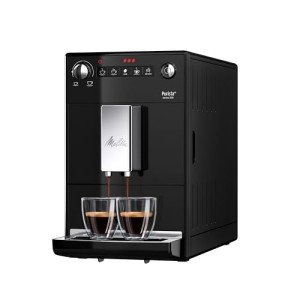Home Use Espresso Machines The Process Isn't As Hard As You Think

Home Use Espresso Machines: A Comprehensive Guide
Espresso machines have actually become a staple in lots of households as coffee enthusiasts seek to duplicate café-quality brews in the convenience of their kitchen areas. The increase in appeal has actually resulted in a varied market filled with various models, functions, and costs. This short article intends to offer an informative introduction of home use espresso machines, assisting readers navigate their options successfully.
Understanding Espresso Machines
Espresso machines work by forcing warm water through finely-ground coffee under high pressure, resulting in a focused coffee drink referred to as espresso. There are a number of types of espresso machines classified based upon their developing methods and level of automation. The most common types consist of:
- Manual Espresso Machines: These require the user to manage the pressure and water flow, permitting a more hands-on coffee-making experience.
- Semi-Automatic Espresso Machines: These offer automatic control over water pressure, while the user by hand grinds and tamps the coffee.
- Automatic Espresso Machines: With the push of a button, these machines instantly control the circulation of water, making it much easier to brew espresso with consistent outcomes.
- Super-Automatic Espresso Machines: These all-in-one machines handle grinding, tampering, developing, and even milk frothing, making them perfect for users looking for benefit.
- Pill or Pod Machines: These use pre-packaged coffee pods to produce espresso with minimal effort, but they limit option in developing methods and tastes.
Table: Comparison of Espresso Machine Types
| Type | Control Level | Ease of Use | Cleaning up Level | Ideal For |
|---|---|---|---|---|
| Manual | User-controlled | Moderate | High | Coffee purists |
| Semi-Automatic | Partial automation | Moderate | Moderate | Home baristas |
| Automatic | Fully automated | Easy | Low | Hectic individuals |
| Super-Automatic | Fully automated | Really easy | Very low | Convenience hunters |
| Capsule/Pod | Fully automated | Really simple | Really low | Casual drinkers |
Secret Features to Consider
When choosing a home use espresso machine, it's important to consider numerous features that can significantly affect the quality of espresso and user experience.
- Pressure: Look for machines that supply at least 9 bars of pressure, as this is thought about ideal for brewing espresso.
- Boiler Systems: Single vs. dual boiler systems figure out temperature level stability and the capability to brew espresso and steam milk concurrently.
- Grinder: Integrated mills permit newly ground coffee, which enhances taste. Consider Espresso Machines Under £500 with adjustable grind settings.
- Milk Frother: For those who take pleasure in cappuccinos and lattes, an integrated steam wand or automatic frother is important.
- Size and Design: Consider your cooking area area and visual preferences. Machines are available in numerous sizes, from compact to big setups.
- Cost: Home espresso machines can range from a couple of hundred to several thousand dollars, so it's essential to develop a budget before checking out alternatives.
Pros and Cons of Home Use Espresso Machines
| Pros | Cons |
|---|---|
| Benefit of brewing coffee in your home | Initial financial investment can be high |
| Quality of espresso is typically exceptional | Requires some skill, especially with manual machines |
| Capability to experiment with tastes | Maintenance and cleaning can be labor-intensive |
| Can conserve cash in the long run | Not all machines will suit every coffee choice |
Upkeep and Cleaning Tips
Maintaining an espresso machine is crucial for prolonging its life and ensuring consistent brew quality. Here are some helpful suggestions:
- Regular Descaling: Minerals from water can develop in the machine. Descale every 1-3 months, depending upon water firmness.
- Daily Cleaning: Rinse portafilters, baskets, and steam wands after each use to prevent coffee oils from developing residue.
- Use Filtered Water: This can help in reducing mineral buildup and enhance the taste of coffee.
- Change Gaskets and Seals: These elements might wear gradually and needs to be replaced to keep pressure and performance.
- Read the Manual: Each machine has particular care guidelines; following these will guarantee longevity.
FAQs About Home Use Espresso Machines
Q1: What is the very best budget espresso machine?The best budget espresso machine typically depends on specific requirements, but models like the DeLonghi EC155 or the Breville Bambino are popular amongst users for providing fantastic value. Q2: How long do home espresso machines typically last?With appropriate upkeep, home espresso machines can last anywhere from 5 to 15 years, depending upon the quality of the machine and frequency of use. Q3: Can I make cappuccinos and lattes with any espresso machine?While most espresso machines can make cappuccinos and lattes, having a reliable
steam wand or frother is essential for attaining the right milk texture.
Q4: Are super-automatic machines worth the investment?For those who focus on convenience and fast brewing, super-automatic machines can be worth the investment, though they may do not have some customizability in brew strength and flavor. Buy Coffee Machine : What kinds of coffee beans are best for espresso?While personal choice contributes, beans identified as" espresso "blends are typically roasted darker, developing abundant flavors and a creamy texture when brewed.
Investing in a home espresso machine can transform the daily coffee routine into something unique, raising home brews to café quality. By comprehending the different kinds of machines, key features to think about, upkeep needs, and weighing the
benefits and drawbacks, consumers can make educated choices that match their specific preferences. As the espresso culture continues to grow, no matter the option, every brew can be a tasty experience waiting to be appreciated.

